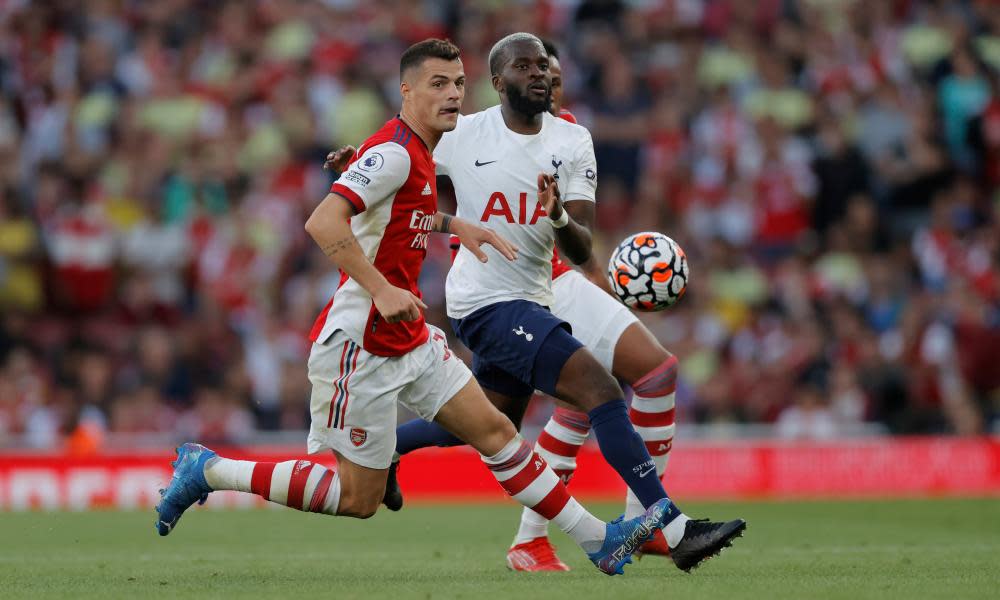Masterful Granit Xhaka the living embodiment of Arsenal’s dream derby

As Tottenham’s defenders glared at each other in reproach for a third time, a beaming Thierry Henry extended his arms in celebration. Enjoying the spectacle with Henry in one of the Emirates’ executive boxes was Daniel Ek, the Spotify co-owner and high-profile suitor for the keys to one of English football’s grandest old estates.
They were revelling in an evisceration: for 45 minutes Arsenal produced football of speed, imagination and incision that recalled some of Henry’s happiest derby experiences. Those stormy days in May, when Ek sought to exploit the fury surrounding Arsenal’s decline and the botched Super League breakaway by making a bid for the club, could not have seemed further away. Wherever he was watching, Stan Kroenke must have felt there was plenty of life in his habitually tormented investment yet.
Related: Rampant Arsenal claim derby spoils as first-half goal blitz sinks Tottenham
Who would pull the plug on the sight of Emile Smith Rowe, Bukayo Saka and Martin Ødegaard flooding into the yawning spaces in front of Tottenham’s defence? Arsenal’s three young schemers were scintillating: against disastrously loose opponents they were simply sharper, quicker and brighter. But while Mikel Arteta has set his stock in the new, realigning his squad at considerable expense to shift its balance from comfortable underachievement, one of his remaining old hands was at the heart of everything Arsenal’s tyros produced here.
When Granit Xhaka’s name appeared on the teamsheet for the first time since a straight red card at Manchester City, the trains of thought were understandable if not entirely original. Arsenal had been resolute, calm and collected in beating Burnley a week previously: now, in the first derby in front of fans here for two years, they were introducing their firebrand to the tinderbox. “We have to play with cool minds and understand what are the limits in the game,” Arteta had said in the buildup when asked directly about his midfielder’s disciplinary record.
So Xhaka stepped out and pushed boundaries of a different kind. This was a masterful performance from the Swiss, who wanted to leave Arsenal during the summer but was persuaded to sign a contract extension after a proposed move to Roma did not materialise. Xhaka’s powers of perception on the ball have not always shone through in an era of slow, stuffy Arsenal engine rooms. His proponents would argue he has not generally been blessed with such a whirr of fizz, wit and invention in front of him; here that argument was strengthened and Arsenal operated in devastating sync.

Within seven minutes a smart first-time ball from Xhaka to Smith Rowe had taken out Spurs’ midfield, or whatever passed for it, resulting in a saved effort from a narrowly offside Pierre-Emerick Aubameyang. The breakthrough was not long in coming: after Ben White beat Harry Kane to a header, Xhaka nipped in to bypass Pierre-Emile Højbjerg with the deftest of snicks to Ødegaard. Arsenal were four against four and, two passes later, Smith Rowe had clipped home Saka’s cutback.
Although 50 yards further back, Xhaka’s influence in the second goal was not dissimilar. Aaron Ramsdale was signed with the intention of improving Arsenal’s distribution from their own penalty area but appeared to have faltered when Højbjerg pursued Xhaka to a short pass out. But Xhaka dropped a shoulder, left a tumbling Højbjerg for dead and found Smith Rowe. The move that followed, a thrilling sweep from one end to the other that Aubameyang finished off, must have rolled back the years for Henry.
Related: Tottenham’s Nuno admits he picked wrong side in defeat to Arsenal
Until half-time the rule of thumb was simple: anything that beat Højbjerg, a hapless figure attempting to anchor Spurs’ midfield, was almost certain to bring a direct threat to Hugo Lloris’s goal. “The gameplan was not right according to the players who were on the pitch,” Nuno Espírito Santo said afterwards. Tottenham certainly improved when Oliver Skipp, replacing the woeful Dele Alli, arrived to divide some of Højbjerg’s midfield labour. But the damage had been done, largely because of Xhaka’s precision in exposing the ragged structure with which Spurs had begun.
The paradox was that Arteta had laid himself open to charges of over-caution when picking Xhaka in place of Nicolas Pépé, ditching the adventurous 4-1-4-1 that started at Turf Moor and opting to field his stalwart alongside Thomas Partey. In selecting Alli and Tanguy Ndombele in front of Højbjerg, Nuno had appeared relatively ambitious. Instead, Xhaka found himself with no end of grateful recipients to feed and Arsenal could run amok.
“These people have stood by this club and these players; this win is for them,” Arteta said of the supporters who, even as Tottenham made a fist of the second half, rarely dialled down the noise. For Smith Rowe, who was outstanding, it was “probably the best day of my life”. Such a rousing afternoon felt like the final removal of a weight, a resounding clearing of the throat: Arsenal will not be lifting league titles here any time soon, but they can point to a clarity and sense of direction that cast Nuno’s team into the shade.
It felt cruel, although perhaps a matter for another day, that the only sour note involved Xhaka. As feared, he left the pitch early: rather than any infraction, though, the cause was a collision with Lucas Moura that appeared to jar his knee. Arteta admitted “it doesn’t look very positive at the moment”. Everything else does, for now. Sitting side by side, Henry and Ek could marvel, perhaps in some bewilderment, at the difference four months can make.

 Yahoo News
Yahoo News 
